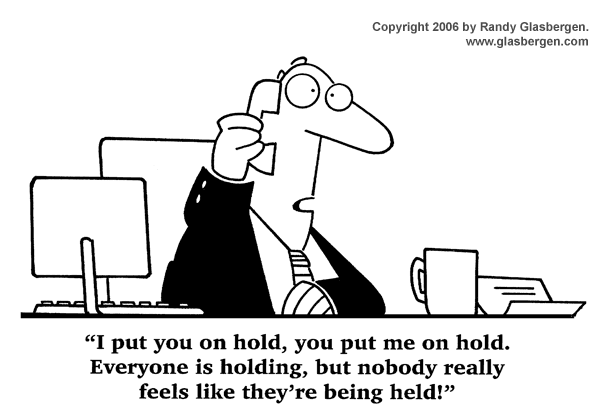
image from glasbergen
There are a few performance metrics that businesses use when measuring the quality of their customer service. The most common one is response time. The number simply measures how quick you are when responding to your customers on average. Everywhere, many companies are always looking for ways to reduce their response time and some managers even evaluate their team performances by looking at this metric religiously.
The logic here is really simple; the lower the response time the faster your service is and the happier your customers are, which means the better your customer service is. The biggest issue with that statement however is that most assume that it always applies to your customers as well as your support team. So, is faster always better? For whom?
A lot of people are impatient in general, and this is the generalisation that may lead you to wrongly assume that fast service is always better. Here comes the trap; fast service might not equal quality service, since there’s always trade-off in everything. What fast response time doesn’t tell you is how attentive or friendly your customer service is, and therefore, while it’s good to have a quick response time, a great business should never rely on vanity metrics. What you think is better to you, might not be better for your customers.

image from Business2community
In addition to that, delivering fast customer service is a demanding job. In the long-run, it is not the most sustainable way on doing support since as your business grows, you’ll be putting enormous pressure on your support team to keep up with increasing number of customers with growingly unrealistic speed expectations. This can lead to poor service quality and accuracy, and after all it might not be better for your business as well.
Managing Customer Expectations
An ideal customer-centric business delivers customer service like delivering a promise. This promise translates to the commitment your business has with your customers. This is basically like telling your customers that while you can’t be 100% perfect in nailing all those performance metrics, there are things they can expect you to not fall short of while servicing them. According to Roy H Williams, a best selling author and marketing consultant, it then becomes your job to find out what the realistic expectations are further in order to exceed them and essentially “wow” your customers with great service.
“The first step in exceeding your customer’s expectations is to know those expectations.” – Roy Hollister Williams.
By having clear expectations, you can set a clear goal for your customer service team by picking the right customer service metrics. This will make sure that your team and your customers can be on the same page when it comes to defining “great service”. Most great companies renowned for their great customer service, such as Zappos, have built their customer service strategy around this idea.
While your customers care about efficient customer service process, always remember that there are many other factors that even fast response time can not compensate such as lack of competencies and friendliness from your customer service team. This is why fast service doesn’t always win.




In boxing, it’s often said that speed is power. And, there’s little doubt that, in terms of the customer experience, responsiveness and response time leverage emotions and contribute to memory and downstream behavior. That said, experience is composed of multiple elements, some of which leave impressions with customers, and some of which have little to no effect. It’s essential to understand, customer by customer, which component(s) of experience most impact behavior, and this is where performance relative to expectations comes into play..
@Michael True; I think understanding the customers would be the most important thing in defining the true customer experience. The issue is that it’s not that straightforward. For instance, in many cases, the hardest part for the CX consultants and managers would be to extract accurate touchpoints data to analyse the customers’ behavior so they can know which key elements matter. On that note, CS managers are facing the similar level of difficulty as they dig deeper into their CS metrics to find out those elements. Due to this challenge, in most cases they blindly decide to go down with response time. Yes, fast response time ‘might’ contribute to better experience.. but that being said, time spent on ticket doesn’t provide much insights about how polite your service team is, or how well taken care of your customers are. These emotional factors will directly impact satisfaction metrics, but rarely response time.
I think expectations might actually help in narrowing down on which metrics matter the most. But as you said, without basic understanding of who we’re selling to, there’s not even a good way to begin defining that expectation, not to mention the standard/bar (performance-wise).
Nice article! I just want to add this little insight. Faster respond is always better. People will think that they are cared and well attended when responded instantly, but we should not overlook quality respond. If you cannot give good and exact respond instantly, explain that you are on your way to it. Both fast and quality respond is the best.